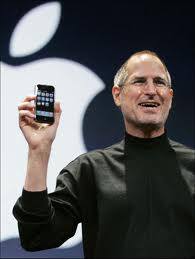 On a recent trip to the Goodwill bookstore, I came across the nearly six hundred page biography of Steve Jobs, written by Walter Isaacson. I thought to myself, “why not?” — and jumped right in. A few months later, with a mind sufficiently blown, I have several takeaways and numerous thoughts from the book that I’m going to have to chew on for quite some time.
On a recent trip to the Goodwill bookstore, I came across the nearly six hundred page biography of Steve Jobs, written by Walter Isaacson. I thought to myself, “why not?” — and jumped right in. A few months later, with a mind sufficiently blown, I have several takeaways and numerous thoughts from the book that I’m going to have to chew on for quite some time.
As I have talked with friends and colleagues about Steve Jobs, most hold the belief that he was either crazy, brilliant or an overbearing control freak. Given the fact that he built Apple to be the world’s most valuable company, it’s safe to say there’s a method to his madness and great wisdom can be gained from learning about his life. Here are some of my favorite highlights.
1. Make Great Products
At his core, Steve Jobs was an artist with an eye for beautiful art. As a child, his father taught him the importance of making even the inside of the product, that no one ever sees, as beautiful as the outside. I was fascinated by his process of designing the packaging for his products. Did you know Apple has patented their packaging?
The result of this was products that were priced higher than the competition but of much greater quality. This philosophy really resonates with me as a lover of quality and continuous improvement.
2. The End To End Customer Experience
In a world where the software companies made software, hardware companies made the hardware, and the two combined to make an inexpensive, poorly designed product, Steve Jobs clung to the philosophy that Apple computer should produce both. Apple turned this into an art form where they completely controlled the customer experience from the time the customer enters the Apple store to their complete experience with the product.
The best example of this is the creation of iTunes and the ability of the user to manage their musical collection on their computer and sync with an iPhone. Because Apple controls the entire experience, they can make it smooth and seamless. Steve Jobs would never trust another company to create any part of this experience.
3. Simplicity Takes A Lot Of Work
Prior to owning my first Mac, I could not understand how a mouse with one button could be considered simple. Steve Jobs fought to make products as simple as possible. He found a way to make a mouse with one button in a world of two or three button mice. He was completely opposed to on/off switches. He believed a single button could do both. He was attracted to Zen-like simplicity and it shows in all Apple products.
Another example of simplicity can be seen when he returned to Apple in 1996. Upon his return he immediately slashed Apple’s product offering down to four products and focused the company on doing those well.
4. Working With “A” Players
Steve Jobs absolutely bought into the philosophy from the book “Good To Great” of having the right people in the right seats on the bus. The book is filled with instances where Steve Jobs routinely pushed people to do things they never thought possible. A “B” player might respond to this push by quitting whereas an “A” player might instead push back and gain his respect. He clearly recognized talent and while he might be hard on them, he could also get the best out of them.
The best example of this is from his time at Pixar before returning to Apple. When he arrived at Pixar he recognized that John Lasseter and his team were true artists. With his push and some amazing negotiating with Disney, Pixar produced the likes of Toy Story, Cars and other classic animated films.
5. Walking Meetings
Steve Jobs was known for having walking meetings with his friends and colleagues. On their walks they would discuss issues and ideas. Having sat in many a stuffy conference room, I see the wisdom in this. On a beautiful day, consider taking your meetings outside and getting a little exercise while you’re at it.
Conclusion
With this great man came many flaws and imbalances. He was far from perfect and the fact that we got a glimpse of that gives the book a real authenticity. While I seriously doubt I could have worked for a man like Steve Jobs without being eaten alive, I am certain that his philosophy of doing business and leading a company is inspiring and would propel even me to produce work I never thought possible.



